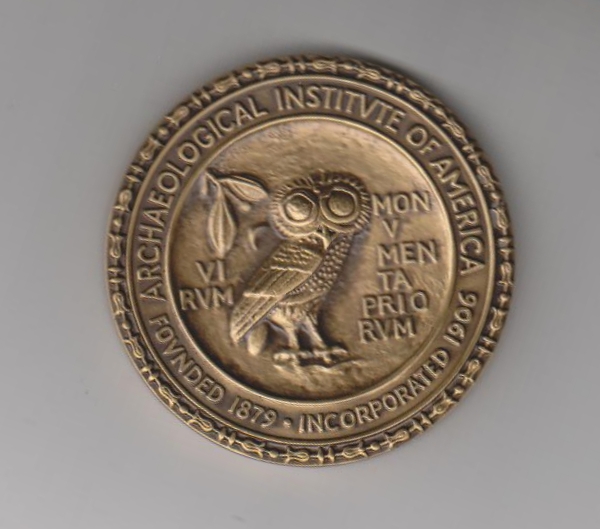The Archaeological Institute of America (AIA) promotes archaeological inquiry and public understanding of the material record of the human past to foster an appreciation of diverse cultures and our shared humanity. The AIA supports archaeologists, their research and its dissemination, and the ethical practice of archaeology. The AIA educates people of all ages about the significance of archaeological discovery and advocates the preservation of the world’s archaeological heritage (source).
Each year, the Archaeological Institute of America presents a number of awards to archaeologists, educators, authors, and others whose work has had a positive impact on the field of archaeology. Each award recognizes excellence on the part of an individual or a group of individuals engaged in the pursuit of human knowledge through archaeology or related disciplines (source).
“The Archaeological Institute of America is pleased to present the 2014 Pomerance Award for Scientific Contributions to Archaeology to Waldo Tobler. Tobler is professor emeritus of geography at the University of California, Santa Barbara, and a member of the National Academy of Sciences. A founding father of geographic information science (GISci) and the geographic information systems (GIS) that have revolutionized numerous scientific aspects of the practice of archaeology, he was instrumental in developing several techniques of spatial analysis. Tobler also played an important role in the National Center for Geographic Information and Analysis scientific consortium, within which interdisciplinary archaeological work has flourished since the 1980s. Tobler’s seminal articles cover analytical cartography, human movement, projections of historical maps, and the design of the first computer technique for digitally superimposing maps within a map in–map out framework. The last technique lies at the heart of today’s modern GIS software. In his work on spatial distributions, Tobler elucidated the “first law of geography,” which directly underpins a wide range of GISci techniques and analyses, including spatial autocorrelation.
The Pomerance Award is the first recognition he has received from archaeologists for the impact of his research on our field. Tobler’s 1971 article “A Cappadocian Speculation,” published with S. Wineburg (Nature [1971] 39–41), used place-name references from the Kültepe cuneiform texts dating to the Old Assyrian Trading Colony period and attempted to situate them in geographic space using models of movement and interaction. It continues to be cited and used within archaeology today. His work on modeling human movement, notably “Tobler’s hiking function,” frequently forms the mathematical basis for archaeological least-cost path analyses. For all these reasons, we honor Waldo Tobler with the 2014 Pomerance Award for Scientific Contributions to Archaeology” (source).
Editor’s note: For more about Waldo’s distinguished career, see the October 25, 2012 article, “Kudos to Professor Emeritus Waldo Tobler.”



